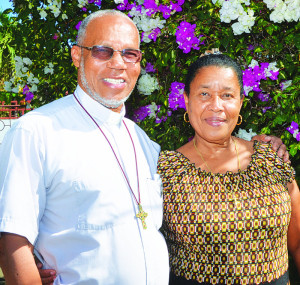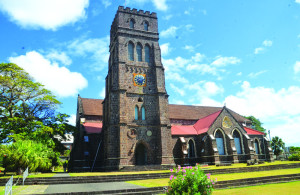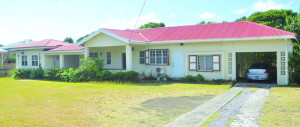


The Venerable Archdeacon, Valentine Hodge, of the St. Kitts Archdeaconry, is an Anguillian national. He is one of the Anglican Church’s administrators working in close cooperation and consultation with his fellow compatriot, The Right Reverend Errol Brooks, Bishop of the Diocese of the Eastern Caribbean and Aruba, who is also the Parish Priest of St Mary’s with St Augustine and St. Andrew’s in Anguilla.
Val, as the Archdeacon is affectionately called by family and friends, took the opportunity of an interview with The Anguillian to speak about his upbringing, life and service, what it means to be a dedicated and responsible Christian leader and to love and help people. A son of the late Herbert and Esther Hodge of Little Dix, he is from what may be referred to as a “Household of Priests”, the majority of his siblings having become Priests mainly as a result of their parental upbringing. He began serving as an educator in Anguilla and St. Kitts over the years, before studying Theology and has served in the Ministry in various capacities.
To start off, here is what Archdeacon Hodge told The Anguillian when the newspaper’s Editor was in St. Kitts several days ago: “Having left The Valley Secondary School in Anguilla, I came to St. Kitts to teach and was at the St. Johnston’s Village School, now the Dr. William Connor Primary School, from 1962 to 1964.I was there for two years. After that I left for the Leeward Islands Teachers’ College in Antigua which I attended from 1964 to 1966. I then returned to Anguilla and taught at the then Road Primary School from 1966 to 1968. It was a small building, to the west of the Bethel Methodist Church, almost in the cemetery at the corner of the road, and I later transferred to the newer school.
“I then went to Codrington Theological College in Barbados where I spent three years. I did the Licentiate in Theology from the University of the West Indies and then went on to Mona, Jamaica, to do my Bachelor’s in Theology from 1971 to 1973.While there, I was made a Deacon in 1972. The ordination was held in Basseterre, St. Kitts, along with William Lake who eventually became Dean Lake. In June 1973 we were both ordained Priests at St. Mary’s, Anguilla.
“After a short stint at St. George’s, Basseterre, as a Cleric, I moved to Sandy Point as Priest-in-charge of St. Anne and St. Thomas in Middle Island. It was from there that I really began to get my feet wet in the Ministry, shall we say. I was there for six-and-a-half years. I left in August 1979 and went to Antigua and was there for twenty-four years…” In one of the districts, St. Lucy and Potters, he succeeded Anguillian Rev. Richard Fahie, now retired.
Archdeacon Hodge continued: “Perhaps you may wish to know some of the things I did while in Antigua. It was more than pastoral ministry. I was involved in teaching Caribbean History at the Antigua Grammar School for twenty-one years. I also helped with the Challenge Exams of the Extra Mural Department of the University of the West Indies where I lectured in Sociology for which I have a great love. I also assisted with the Department of Christian Education of the Church, and that involved instruction for Lay Readers and Continuing Education of the clergy. I was also Editor of the Angelus, our Diocesan newspaper. Looking back now, I often wonder how I managed to do all of those things at one go. But it was very interesting being with the wider society in Antigua, sharing ideas and that sort of interaction.
“In more recent years, in September 2003, I was asked by the Bishop to become the Parish Priest of St George’s, Basseterre, with St. Barnabas. This was to succeed Archdeacon Rudolph Smithen who had become Dean of the Cathedral when Dean William Lake passed – and by October 1st, of that year, the Bishop appointed me Archdeacon.” In earlier years, Archdeacon Hodge was appointed as a Canon of the Cathedral.
The Anguillian Archdeacon of St Kitts was asked about his role. “As an Archdeacon, I assist the Bishop with running the administration of the Diocese,” he explained. “Our Diocese, which is called the Diocese of the North Eastern Caribbean and Aruba, was formerly the Diocese of Antigua. As a result of a Synod held in Anguilla in 1986, the Diocese of Antigua became the Diocese of the North Eastern Caribbean and Aruba to reflect more the geographical status of the islands, many of them having become independent. You have Dutch, French and British territories as well so it was more comprehensive. Then you also have Aruba, where many Anguillians worked in the oilfields. The Archdeaconry of St. Kitts includes the islands of St. Kitts, Nevis, Statia, St Barths, St. Maarten, Anguilla and Aruba.”
By way of further information, Archdeacon Hodge said: “The Archdeacon of Antigua is now outgoing. He was the Venerable Peter Andrew Daley. He is retired and there is now a vacancy at the moment. That will be filled at the Bishop’s pleasure.” The Antigua Archdeaconry, as the St. Kitts Archdeacon explained, includes all the other islands in the Diocese of the Eastern Caribbean.
The top Anguillian clergyman was asked what influenced his entry into the ministry. “As a boy, I was a server, as you perhaps know, at St. Mary’s, Anguilla, for many years” he replied. “Even, while at schooI, I felt I had this call to serve the people of God as well as to be involved in church life. In those days, there were not many distractions as we have today, with sports and certainly the internet and so on. Those days your life really hinged on the church and the church became the centre of a lot of things – whether it was scouting or CLB, guiding and so on. So I was encouraged in that area to reach out to people and to help as much as I can. I went into teaching before ministry because I felt that teaching would be a good steppingstone to the work of ministry. I was delighted that I did that, and I chose teacher training as well because that helped me to develop a broader picture of life and a broader picture of ministry.”
“Parental training and upbringing also contributed to my decision, as well. My mother was a stewardship person for many years – persons like her were called ‘Collectors’ in those days. She would collect the monies in a particular district and give them to the priest as a form of remuneration. She would also assist the priest in going to take communion to the sick. She taught in the Sunday school and was in the choir for many years in her own upbringing. So that actually spilt over into her family life and my siblings as well.”
It is no surprise, therefore, that Archdeacon Hodge comes from a household of priests as in Biblical times. “I have brothers who are also in the ministry,” he said. “I have a brother, Vincent Stafford Hodge, who is a priest in Virginia; Father Vanier Menes Hodge in Anguilla and Father Irad Hodge in St. Maarten. They are now retired, but assist tremendously in the ministry. I have a brother, Roy Reginald Hodge – we call him Reggie – who is a Deacon in the church in St. Thomas and one of these days he may be a priest as well. My other brother, the late Vernon Hodge, served as a Lay Reader when he was in St. Maarten and so we have that kind of combination. I have three sisters – two in England and one in St. Thomas and they attend church regularly. My sister, Carmen Huggins, in England, may be regarded nowadays as a Eucharistic Minister. She used to serve in the church taking communion to the sick so that they feel part and parcel of what took place in church. Another sister, Elvise Hickson, is in St. Thomas; and a younger sister, Joycelyn Caines, is also in England. Only the two of them have not had any formal training in ministry.”
Archdeacon Hodge, could easily have been serving in one of the many lucrative professions in life, but he loves the priesthood. “I would say there is a lot of fulfilment in ministry,” he stressed. “I do not have any regrets really. It is not the kind of job where you get a lot of money as you would as a doctor, lawyer, business person or an architect, but it is enough to live on. Apart from that, being able to assist people at an everyday level has its own rewards. So you find that in ministry you are helping people who are sick, in need, or want support emotionally, financially or otherwise.”
He gave one example of his involvement in helping people which may be an example for churches in his native Anguilla. “We have here on the Bay Road, in Basseterre, St. Kitts, an ecumenical programme to help people who need food,” he reported. “We provide a hot meal from Monday to Friday, sponsored by the churches and assisted by the Rams Group of Companies. Mr. Kishu Chandiramani, now deceased, but was the Manager of the Rams Group of Companies, as part of the 75th anniversary of his work here, decided to do something for the people of St. Kitts. He felt the best thing to do was to provide a soup kitchen called the St. Christopher Outreach Centre. That business provides the provisions – meat, fish, rice, vegetables and so on – for a hot meal everyday. The churches support this group of companies and they support us. We provide finance to pay the cooks; we pay for electricity, gas and other things. It is a very big undertaking which provides food for about a hundred persons each day. These are street persons, the mentally disabled as well as shut-ins. There are also two doctors and nurses to perform sugar and blood pressure tests and treatment. We have washrooms and clothing, towels and other facilities. The centre comes directly under the office of the St. Kitts Christian Council and it so happens that I am the Vice Chairman. The chair is no longer here, so I have taken over. This Council includes the Catholics, Anglicans, Methodists, Moravians and the Salvation Army.”
The Archdeacon would like that effort to be introduced across the rest of the Diocese. “I would certainly be the first to encourage our churches – if they can join together ecumenically, instead as individual churches,” he recommended.
He spoke about another initiative of the church in St. Kitts which he would like to see emulated throughout the Diocese. “Today I see our church as having to be involved in every area of life in our community,” he stated. “It must encourage Christians to be good citizens; to share in the governance of society; and encourage citizens to be healthy. We have a programme in which we are focusing on the health of our membership in conjunction with the Ministry of Health. The programme includes such degenerative diseases as hypertension, cardiac problems, diabetes and others, so that our people could be healthy; to know what foods to eat; and what exercises to be engaged in. The church also has to encourage people to work and to be involved in good housing.”
He would also like to see the church involved in helping to maintain the peace and quiet in all communities. “That is a big issue here in our Federation,” the Archdeacon continued. “With the increased crime, I think in 2015 we have had ten murders so far – and one murder is one too many. We continue to speak out against it; to preach against it; to teach the commandments as part of our Christian education; and we encourage the schools to have some civic classes and programmes. Family life must be important because a lot of it [crime] has to do with the homes from where the children come. If we teach the Word of God in our homes, our schools and neighbourhoods, then the wider society would benefit from that. I think we all are responsible for the kind of societal malaise which we have today, and the attitude towards crime. We have to assist the police in helping with our neighbourhood watches and so on. All of this must be seen as a national effort. That would be my advice to everyone in the Diocese [including Anguilla]: that everyone must see the problem of crime as an individual problem. If everyone took up that sort of a mantle and became responsible for everyone else, then you will find that crime will be reduced and we would be looking out – not only for our own interest, but the interest of others.”
As mentioned above, Archdeacon Hodge works closely with his compatriot, Bishop Errol Brooks. They have two things in common. One is that they are both Anguillians, coming from a background of ordinary Christian families. The second is that though having risen to top and leadership positions in the Anglican Ministry, they both have maintained the humble positions of Parish Priests, having their own congregations, rather than serving altogether within the confines of the lofty St. John’s Cathedral.
On this matter, Archdeacon Hodge had this to say: “No matter how exalted one may become, you must never lose the common touch. You must never fail to be with people; so becoming an Archdeacon, or a Bishop in the Caribbean, today, doesn’t really distant you from people. It should make you more humble really, and I think that has been our stance – certainly my stance – over these years since becoming an Archdeacon. It is simply a role which you play – enabling people more and more – rather than remaining aloof.”
In the St.Kitts Archdeaconry, the top clergyman has at side his supportive wife, Mrs Ouida Hodge, a retired Headmistress of the Antigua Girls High School. They have two children: David, 30, Chief Butler at Sandals Hotel in Antigua; and Diana, in her late 20s, a Manager of a Hotel in Kentucky.







